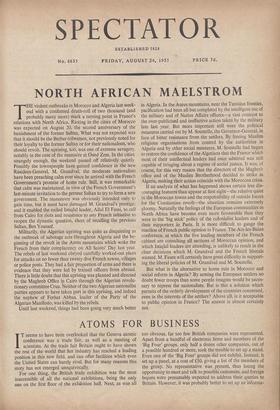NORTH AFRICAN MAELSTROM
THE violent outbreaks in Morocco and Algeria last week- end with a confirmed death-roll of two thousand (and probably many more) mark a turning point in France's relations with North Africa. Rioting in the cities of Morocco was expected on August 20, the second anniversary of the banishment of the former Sultan. What was not expected was that it should be the Berber tribesmen, not previously noted for their loyalty to the former Sultan or for their nationalism, who should revolt. The uprising, too, was one of extreme savagery. notably in the case of the massacre at Oued Zem. In the cities. strangely enough, the weekend passed off relatively. quietly Possibly the townspeople have gained confidence in the new Resident-General, M. Grandval; the moderate nationalists have been preaching calm ever since he arrived with the French Government's promise of home rule. Still, it was remarkable that calm was maintained, in view of the French Government's last-minute invitation to the present Sultan to try to form a new government. The manoeuvre was obviously intended only to gain time, but it must have damaged M. Grandval's prestige: and it enabled the exiled Istiqlal leader, Allal El Fassi, to call from Cairo for riots and resistance to any French initiative to reopen the dynastic question, short of recalling the previous Sultan, Ben Youssef.
Militarily, the Algerian uprising was quite as disquieting as the outbreak of sabotage acts throughout Algeria and the be- ginning of the revolt in the Aures mountains which woke the French from their complacency on All Saints' Day last year. The rebels of last weekend obeyed carefully worked-out plans for attacks on no fewer than twenty-five French towns, villages or police posts. They had a fair proportion of arms and there is evidence that they were led by trained officers from abroad. There is little doubt that this uprising was planned and directed by the Maghreb Office in Cairo through the Algerian revolu- tionary committee Crua. Neither of the two Algerian nationalist parties appears to have taken part in this uprising, and indeed the nephew of Ferhat Abbas, leader of the Party of the Algerian Manifesto, was killed by the rebels.
Until last weekend, things had been going very much better in Algeria. In the Aures mountains, near the Tunisian frontier, pacification had been all but completed by the intelligent use of the military and of Native Affairs officers—a vast contrast to the over-publicised and ineffective action taken by the military late last year. But more important still were the political measures carried out by M. Soustelle, the Governor-General, in face of bitter resistance from the settlers. By freeing Muslim religious organisations from control by the authorities in Algeria and by other social measures, M. Soustelle had begun to restore the confidence of the Algerians that the France which most of their intellectual leaders had once admired was still capable of bringing about a regime of social justice. It was, of course, for this very reason that the directors of the Maghreb office and of the Muslim Brotherhood decided to strike in Algeria, making their action coincide with the Moroccan crisis.
If an analysis of what has happened shows certain less dis- couraging features than appear at first sight—the relative quiet in the Moroccan towns and the responsibility of outside forces for the Constantine revolt—the situation remains extremely gloomy. Naturally the feelings of the European communities in North Africa have become even more favourable than they were to the 'big stick' policy of the colonialist leaders and of their supporters in Paris. It is more difficult to gauge the reaction of French public opinion in France. The Aix-les-Bains conference, at which the five leading members of the French cabinet are consulting all sections of Moroccan opinion, and which Istiqlal leaders are attending, is unlikely to result in the clear decisions which M. Grandval and the French liberals wanted. M. Faure will certainly have great difficulty in support- ing the liberal policies of M. Grandval and M. Soustelle.
But what is the alternative to home rule in Morocco and social reform in Algeria? By arming the European settlers no doubt fewer troops than some people imagine would be neces- sary to repress the nationalists. But is this a solution which permits of the orderly development of the countries concerned, even in the interests of the settlers? Above all, is it acceptable to public opinion in France? The answer is almost certainly not.


































 Previous page
Previous page